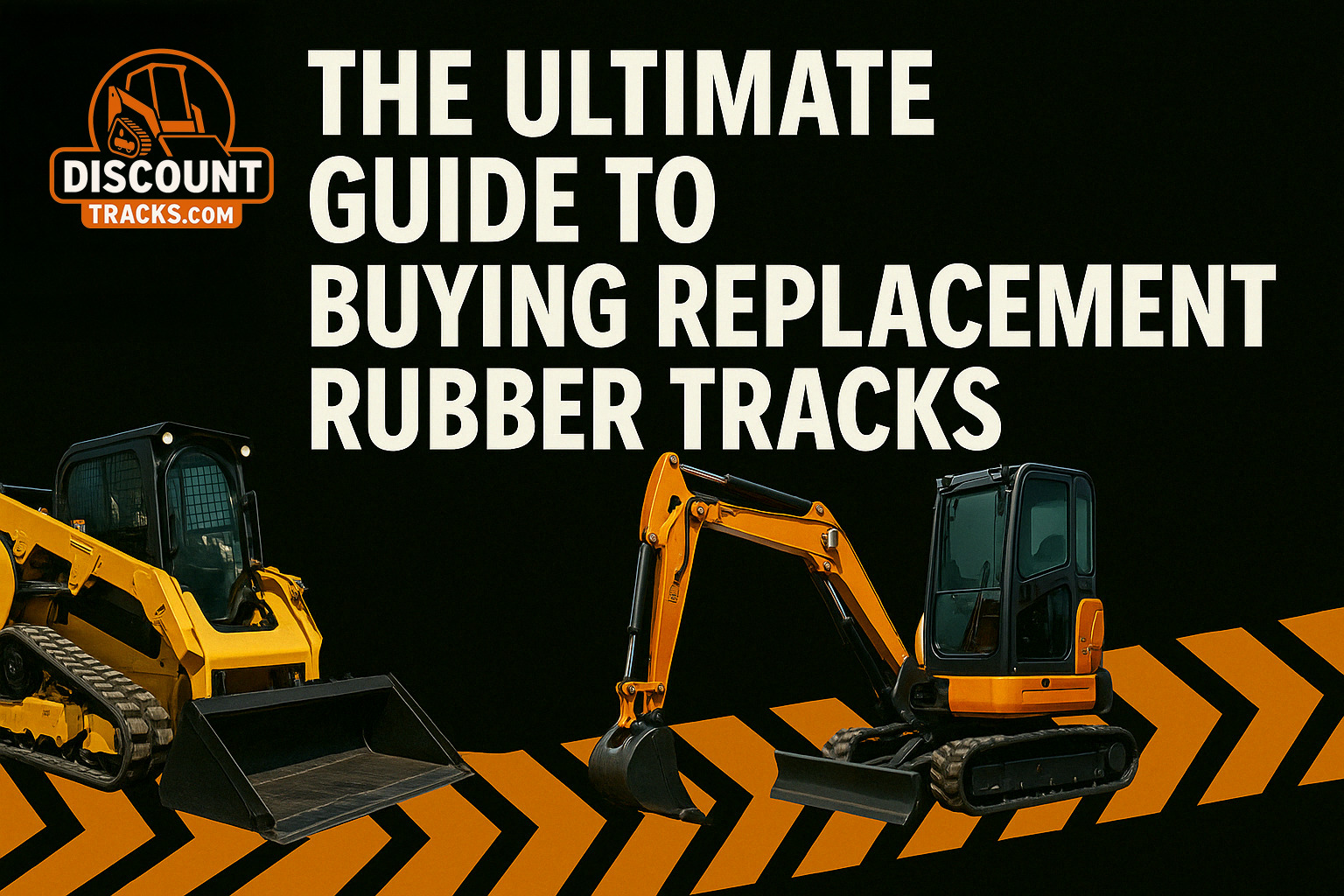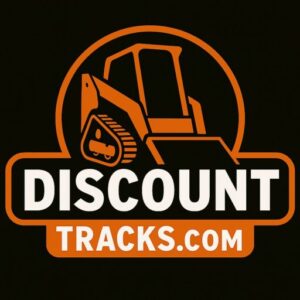Replacing rubber tracks is a significant investment, and finding the right ones can be overwhelming. Between rubber track sizing, tread pattern options, construction quality, and cost considerations, it’s easy to feel unsure about what to choose. A poor decision can lead to premature wear, poor traction, or even damage to your equipment.
That’s why we created this ultimate rubber track buying guide—so you can make an informed, confident decision. Whether you run a skid steer, mini excavator, or CTL, this guide covers everything you need to know about buying replacement rubber tracks that balance quality, performance, and price.
Why Getting the Right Replacement Tracks Matters
Choosing the right rubber tracks isn’t just about fit—it’s about maximizing uptime and protecting your equipment.
- Performance: Correct tracks improve traction and machine stability.
- Comfort: Reduced vibration improves operator experience.
- Fuel Efficiency: Proper tracks reduce rolling resistance.
- Undercarriage Protection: The right size and pattern help prevent costly damage.
- Surface Compatibility: Some tracks minimize ground disturbance.
Step 1: Nail Down the Correct Rubber Track Size
Why Size is Critical
An incorrectly sized track can cause poor fitment, constant de-tracking, accelerated wear, and even damage to your undercarriage.
How to Find Your Track Size
- Method 1: Check Existing Track Markings Look for molded or stamped size codes on the inner side of your current tracks (e.g., “450x86x52”).
- Method 2: Use Your Machine Info Note your machine’s make, model, and serial number—Discount Tracks offers lookup tools and expert help to find your match.
- Method 3: Manually Measure Measure:
- Width (mm): The total track width.
- Pitch (mm): Distance between link centers.
- Links: Total number of metal bars or links.
Understanding Rubber Track Size Numbers
Rubber track sizes are typically written as: Width (mm) x Pitch (mm) x Links (count). For example, 300×52.5×84 means:
- 300mm wide
- 52.5mm pitch
- 84 total links
Step 2: Choose the Right Rubber Track Pattern for Your Application
Track patterns dramatically affect traction, ride quality, and surface wear. Choosing the correct one ensures optimal machine performance in your working environment.
Common Rubber Track Patterns Explained
- Block Lug Pattern
- Versatile; works on asphalt, concrete, gravel
- Provides balanced traction and ride comfort
- Pros: Durable, multipurpose
- Cons: May clog in muddy conditions
- C-Lug / Offset Block Pattern
- Aggressive tread for muddy, uneven terrain
- Offers enhanced traction and self-cleaning
- Pros: Great grip and bite
- Cons: Slightly rougher ride on hard surfaces
- Staggered Block Pattern
- Combines traction with smoother ride
- Often seen as an all-around choice
- Pros: Good balance of comfort and durability
- Cons: May wear faster on very abrasive surfaces
- Turf-Friendly / Smooth Pattern
- Minimal ground disturbance
- Ideal for landscaping or golf courses
- Pros: Protects delicate turf
- Cons: Less traction in wet/muddy conditions
Matching Pattern to Terrain & Job
- Hard Surfaces (asphalt/concrete): Block Lug or Staggered Block
- Muddy or Loose Terrain: C-Lug or Offset Block
- Mixed Use: Staggered Block
- Landscaping/Lawn Work: Turf-Friendly
Step 3: Evaluate Rubber Track Quality Indicators
Price matters—but so does quality. Cheap tracks that fail early cost more in the long run. Here’s what to check.
Key Quality Factors to Look For
- Rubber Compound
- High-quality blends include both natural and synthetic rubber for durability and flexibility.
- Look for resistance to cuts, tears, and extreme temps.
- Internal Steel Cords/Cables
- Continuous steel cords improve strength and alignment.
- Thicker, corrosion-resistant cables last longer.
- Metal Inserts/Embeds
- Forged inserts offer better strength and bonding.
- Weak inserts lead to de-tracking or blowouts.
- Manufacturing Process & Standards
- Tracks made under ISO-certified processes offer better consistency and testing.
The Importance of the Warranty
A good warranty reflects confidence in the product.
- Look for: Coverage against manufacturing defects, clear warranty periods.
- Prorated vs. Full Replacement: Understand terms—Discount Tracks offers competitive warranties on all tracks.
Step 4: Considering Your Budget – Finding the Best Value
We get it—cost matters. But don’t let the lowest price lead to poor performance.
Factors Influencing Rubber Track Cost
- Track size (wider or longer = more material)
- Lug pattern complexity
- Material quality
- Brand/OEM pricing
OEM vs. Aftermarket Tracks
- OEM Tracks:
- Made by original equipment manufacturers
- Often very expensive
- Aftermarket Tracks:
- High-quality options (like Discount Tracks) offer excellent performance at a more budget-friendly price
- Compare based on cost per hour—not just purchase price
Bringing It All Together: Your Replacement Track Checklist
Before you buy, ask:
Why Choose Discount Tracks for Your Replacement Needs?
- High-Quality Tracks: Tested for performance and durability
- Competitive Pricing: Get excellent value without compromising quality
- Wide Inventory: Tracks available for skid steers, CTLs, mini excavators, and more
- Expert Support: Our team helps you find the perfect fit
Conclusion
Choosing the right replacement rubber tracks doesn’t have to be difficult. With the right guidance, you can find a cost-effective, high-quality option that keeps your equipment running longer and stronger.
By considering track size, tread pattern, material quality, and budget, you’re well-equipped to make the best choice.
Ready to find the perfect replacement rubber tracks for your machine? Browse our full selection or contact our experts today for personalized help!


